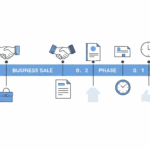How to Value My Business for Sale: The Complete 2025 Guide for Maximum Return
Are you a business owner asking yourself, “How do I value my business for sale?” You’re not alone. Determining the right asking price for your business is one of the most critical decisions you’ll make in the selling process. Get it wrong, and you could either leave money on the table or scare away potential buyers with an unrealistic price.
In this comprehensive guide, we’ll walk you through the proven methods to accurately value your business for sale in 2025, helping you maximize your return while attracting serious buyers.
Why Accurate Business Valuation Matters When Selling
Before diving into valuation methods, it’s crucial to understand why getting your business valuation right is so important:
- Attracts Serious Buyers: A realistic price draws qualified buyers who are ready to move forward
- Speeds Up the Sale Process: Properly priced businesses sell 40% faster than overpriced ones
- Maximizes Your Return: Strategic pricing can increase your final sale price by 15-25%
- Reduces Negotiation Stress: Fair pricing leads to smoother negotiations
- Builds Buyer Confidence: Professional valuation demonstrates transparency and credibility
The 5 Most Effective Business Valuation Methods for 2025
1. Seller’s Discretionary Earnings (SDE) Method
The SDE method is the gold standard for valuing small to medium-sized businesses. This approach calculates your business’s true earning potential by adding back owner benefits to net profit.
How to Calculate SDE:
SDE = Net Profit + Owner Salary + Owner Benefits + Interest + Taxes + Depreciation + One-time Expenses
Owner benefits include:
- Personal expenses run through the business
- Excessive owner compensation
- Family member salaries for minimal work
- Personal vehicle expenses
- Travel and entertainment expenses
Once you have your SDE, multiply it by the industry-specific multiple (typically 1.5x to 4x for most small businesses).
2. EBITDA Multiple Method
EBITDA (Earnings Before Interest, Taxes, Depreciation, and Amortization) is preferred for larger businesses with revenues over $5 million.
EBITDA Calculation:
EBITDA = Net Income + Interest + Taxes + Depreciation + Amortization
Industry multiples for EBITDA typically range from 3x to 8x, depending on:
- Industry growth prospects
- Business size and stability
- Market conditions
- Competitive advantages
3. Asset-Based Valuation
This method values your business based on its tangible and intangible assets minus liabilities.
Asset Categories to Consider:
- Tangible Assets: Equipment, inventory, real estate, cash
- Intangible Assets: Customer lists, brand value, patents, goodwill
- Liabilities: Debts, accounts payable, accrued expenses
Business Value = Total Assets – Total Liabilities
4. Revenue Multiple Method
This straightforward approach multiplies your annual revenue by an industry-specific multiple.
Business Value = Annual Revenue × Industry Multiple
Common revenue multiples by industry:
- Professional Services: 0.5x – 2.5x
- Manufacturing: 0.4x – 1.2x
- Retail: 0.2x – 0.8x
- Technology: 1x – 5x
- Healthcare: 0.8x – 2.5x
5. Discounted Cash Flow (DCF) Analysis
The DCF method projects future cash flows and discounts them to present value. While complex, it’s highly accurate for businesses with predictable cash flows.
DCF Steps:
- Project cash flows for 5-10 years
- Determine terminal value
- Select appropriate discount rate
- Calculate present value of all cash flows
Critical Factors That Impact Your Business Value
Financial Performance Factors
- Revenue Growth: Consistent 10%+ annual growth increases value significantly
- Profit Margins: Higher margins indicate operational efficiency
- Cash Flow Stability: Predictable cash flows reduce buyer risk
- Financial Records: Clean, audited financials command premium prices
Operational Factors
- Owner Dependence: Businesses that run without owner involvement are worth more
- Management Team: Strong leadership team increases value by 20-30%
- Systems and Processes: Documented procedures reduce operational risk
- Customer Concentration: Diversified customer base is more valuable
Market Factors
- Industry Trends: Growing industries command higher multiples
- Competition: Unique market position increases value
- Economic Conditions: Market timing affects buyer demand
- Geographic Location: Prime locations add significant value
Common Business Valuation Mistakes to Avoid
1. Emotional Pricing
Many business owners price based on emotional attachment rather than market reality. Your business is worth what buyers are willing to pay, not what you think it should be worth.
2. Using Outdated Financial Data
Ensure your financial statements are current and accurately reflect your business’s performance. Buyers want to see recent trends, not historical data from years ago.
3. Ignoring Market Conditions
Market conditions significantly impact business values. A booming economy might support higher multiples, while economic uncertainty could depress values.
4. Overlooking Intangible Assets
Don’t undervalue intangible assets like customer relationships, brand recognition, or proprietary processes. These can represent 30-70% of your business value.
5. Failing to Normalize Earnings
Many owners don’t properly “recast” their financials to show true earning potential. This includes adding back owner perks and one-time expenses.
Step-by-Step Guide to Value Your Business for Sale
Step 1: Gather Financial Documents
- 3-5 years of tax returns
- Profit & loss statements
- Balance sheets
- Cash flow statements
- Asset and equipment lists
Step 2: Normalize Your Financials
- Add back owner salary and benefits
- Remove one-time expenses
- Adjust for market-rate management salaries
- Account for deferred maintenance
Step 3: Research Industry Multiples
- Use industry reports and databases
- Analyze recent comparable sales
- Consult with business brokers
- Review market conditions
Step 4: Apply Multiple Valuation Methods
- Calculate SDE or EBITDA multiples
- Perform asset-based valuation
- Apply revenue multiples
- Consider DCF analysis for larger businesses
Step 5: Adjust for Business-Specific Factors
- Account for growth potential
- Consider competitive advantages
- Evaluate management strength
- Assess market position
When to Hire a Professional Business Appraiser
While you can perform initial valuations yourself, consider hiring a professional appraiser when:
- Your business is worth over $1 million
- You have complex ownership structures
- Significant intangible assets are involved
- You need a formal valuation for legal purposes
- Multiple valuation methods yield vastly different results
Types of Professional Appraisers
- Certified Business Appraisers (CBA): Specialized in business valuations
- Accredited Senior Appraisers (ASA): Broad appraisal expertise
- Certified Valuation Analysts (CVA): Financial analysis focus
Maximizing Your Business Value Before Sale
Financial Improvements
- Clean up financial records and implement proper accounting systems
- Reduce owner dependence by hiring key management
- Diversify customer base to reduce concentration risk
- Improve profit margins through cost optimization
Operational Enhancements
- Document all systems and processes
- Invest in technology and equipment upgrades
- Strengthen management team and employee retention
- Develop recurring revenue streams
Strategic Positioning
- Protect intellectual property and trade secrets
- Secure long-term contracts with key customers
- Build competitive moats and barriers to entry
- Position for industry growth trends
Business Valuation Tools and Resources
Online Valuation Calculators
While not substitutes for professional appraisals, these tools provide helpful starting points:
- BizEx Business Valuation Calculator
- EquityNet Valuation Tool
- BizBuySell Valuation Calculator
Industry Data Sources
- IBISWorld Industry Reports
- Pratt’s Stats Transaction Database
- BizComps Transaction Database
- EBITDA Multiples by Industry Reports
Timing Your Business Sale for Maximum Value
Best Times to Sell
- Strong Financial Performance: After 2-3 years of consistent growth
- Industry Upswing: During favorable industry conditions
- Economic Stability: When credit markets are accessible
- Personal Readiness: When you can dedicate time to the sale process
Market Timing Considerations
- Interest rates and lending conditions
- Industry consolidation trends
- Economic cycles and business confidence
- Seasonal factors affecting your industry
Frequently Asked Questions
How long does a business valuation take?
A professional business valuation typically takes 2-4 weeks, depending on business complexity and data availability. Self-conducted valuations can be completed in a few days with proper preparation.
How much does a professional business valuation cost?
Professional business valuations range from $3,000 to $15,000 for small to medium businesses, with costs increasing based on business size and complexity.
Should I get multiple valuations?
Yes, obtaining 2-3 valuations using different methods provides a more accurate range and helps validate your asking price.
How often should I update my business valuation?
Update your valuation annually or whenever significant business changes occur, such as major acquisitions, new product launches, or market shifts.
What’s the difference between business value and asking price?
Business value represents fair market value, while asking price is your initial negotiating position. Most sellers price 10-20% above estimated value to allow for negotiation.
Conclusion: Your Next Steps to Value Your Business for Sale
Accurately valuing your business for sale is both an art and a science. By using multiple valuation methods, considering all value drivers, and avoiding common mistakes, you can determine a fair and attractive asking price that maximizes your return.
Remember these key takeaways:
- Use multiple valuation methods for accuracy
- Normalize your financials to show true earning potential
- Consider hiring a professional for complex situations
- Focus on improving value drivers before listing
- Time your sale strategically for maximum return
Ready to get your business valued and start the selling process? Our experienced team of business brokers can help you determine the optimal value for your business and connect you with qualified buyers. We’ve helped over 10,000 business owners successfully sell their businesses for maximum value.
Get your free business valuation consultation today and take the first step toward a successful business sale.






